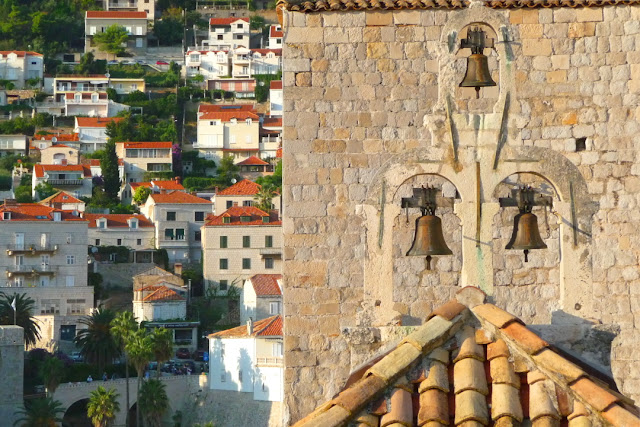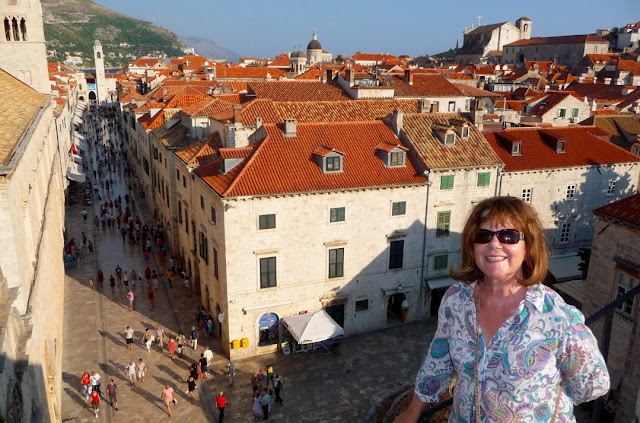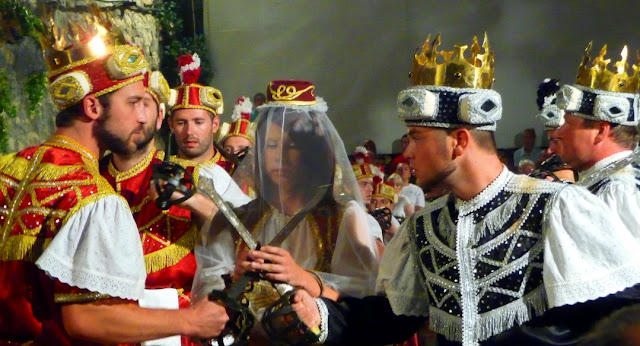We
leave the constancy of summer in Croatia for autumn in Paris, our
last destination on this four-month odyssey. As we emerge from the
labyrinthine underworld of the metro on to 'Pont Neuf', the oldest
bridge in Paris, the sun shines on the Seine.
We
drag the bags over cobblestones to our historic hotel on the 'Isle de
la Cite', in the middle of the river. 'Hotel Henri 4' looks
the same as it did when we stayed here sixteen years ago. We ascend
the same spiral staircase to our room on the fourth floor overlooking
the Place Dauphine. The trees are smaller, their bluish leaves
rusting at the edges; apparently the stately old trees became
diseased and had to be replaced.
But
the town houses surrounding the triangular place are just as elegant
with their wrought iron balconies and there are several new cafes
with canvas awnings where people lunch at sunny tables. Before
unpacking we hurry over to 'La Rose de France' to grab the
last table.
An
American couple at the next table has rented an apartment here for a
month. ''My wife has been here at least thirty times,'' says the
husband with sad brown eyes beneath dark bushy eyebrows. The wife is
blonde and animated and looks younger than her age. ''I love Paris,''
she says. ''I walk every morning.'' She talks a lot and glares at her
husband when he tries to say anything. ''We both can't talk at
once,'' she snarls.
She
goes to meet a friend for afternoon tea, but the husband stays to
chat over a coffee.
''We
would kill each other if we stayed together all day,'' he says with
disarming honesty. ''My wife shops all day. I visit musees. There is
a cinema that shows old American movies.''
After
he leaves I say to Dave, ''They hate each other. We are not
that bad are we?'' He doesn't need to answer. We are in Paris, the
city of love.
Hand
in hand we wander the streets of the Isle, awed by the grand
buildings and monuments, the grim gargoyles of Notre Dame. On impulse
we buy tickets for a classical music concert at Sainte Chapelle,
which has an impossibly high vaulted ceiling and walls of intricate
stained glass. I feel as if I am sitting inside a kaleidoscope or a
gigantic jewellery box with the familiar sounds of Vivaldi's Four
Seasons filling the space.
Winter 1983. Our first visit to Paris. The trees were bare but festooned with Christmas lights along the Champs Elysees. The air was cold but clear and bright. Inside the cafes and restaurants, crowded with people, it was warm and light. We stayed in an attic room in a seedy hotel which smelt of curry and turned into a brothel at night, but we were young and in love and everything was wonderful.
It
was early spring when we returned to Paris for Dave's 50th
birthday. Not as young but still hungry for life. We thrilled at
Rodin's sculptures and the 'Monets' in the Musee D'Orsay
and the cafes on the Left Bank. I searched out cafes where Sartre and
Beauvoir. and their intellectual friends philosophised over coffee
and cigarettes and had passionate love affairs. What a romantic I
was.
How
innocent. How naive.
I
wonder what autumn in Paris will bring, as Vivaldi's exquisite
evocation of the seasons ends bringing the audience to its feet.
We
celebrate with a supper of crepes and French champagne; we have been
up since 3am in Dubrovnik so haul ourselves up the four flights of
stairs and collapse into bed, shutting the windows to silence the
night.
After
a couple of hours I wake. A faint unpleasant smell which I detected
earlier is now nauseating. It smells like a latrine or cat piss. I
cover my face with the sheet but can't sleep all night.
I
lean out of the window over the railing and inhale the night air.
Ambulance sirens sound continuously.
When
I approach the matronly woman at reception the following morning, she
flushes red with anger and says they have never had such a complaint,
they are fully booked, they cannot change our room, they will keep
the money for nine nights if we go to another hotel. ''Madame,'' she
says, ''I think you just want to leave this hotel. Take it up with
the manager.'' This is when I burst into tears and run up four
flights of stairs. For the first time on our travels, I wish I was
wealthy and staying in a luxury hotel. Then I remember the homeless
man sleeping rough on the stone bench of Pont Neuf and I am grateful
for a comfortable bed and hot water and white towels.
We
leave the windows wide open and go out walking. Within half an hour
it is raining and we are unprepared. It rains incessantly all day; we
are soaked to the skin, stopping for an hour or so in cafes to dry
off a little. It isn't until it rains that you realise how little
shelter there is in Paris. People sit at cafes under canvas awnings
heavy with water [one opposite our place splits over night] but the
water drips on passing pedestrians.
 |
| View of the receding storm from the Jardin des Tuileries |
Not
travellers. Wanderers.
Later
that night, Dave is ill with a gastric attack, groaning on the
bathroom floor, too weak to move. I cover him with a blanket and go
to a pharmacy for anti nausea medication; he spends the next day in
bed.
Lunching
alone in another cafe on our square, I speak with two young American
girls about our trip. One with long dark hair and a soft southern
drawl asks where I am travelling from. ''Australia,'' I say.
''Oh,
we met so many Australians in Berlin. Are you on, what do you call
it, 'walkabout'?''
''Well,
I guess you could say that. But it is an expression we use to
describe the itinerant lifestyle of some traditional indigenous
Australians.'' I smile. I like the idea.
Wanderers.
On walkabout. In Paris. That's us.
All
week we walk about Paris. It is much busier and noisier and less
'chic' than we recall it. There are red double decker tourist buses
and river cruisers and long queues everywhere. We queue for an hour
to catch the lift up the Eiffel Tower where the panoramas don't
disappoint; we visit Sacre Cour and wander the streets of Montmarte.
 |
| Our decent through one of the legs of the 'Tour Eiffel' |
There
are still cosy restaurants on the Left Bank serving excellent
traditional French cuisine, but now the waiters will speak in
English. Little galleries sell 'primitive' art, photography and
jewellery to the well-heeled. I glance down at Old Dog's trusty brown
leather lace-ups, his only footwear for four months. Definitely not
in the well heeled category.
He
can't understand why I have acquired four new pairs of shoes. One is
thongs. They don't count, I tell him.
 |
Palais
Royal - Musee du Louvre
|
When
the sun reappears for the weekend, the Seine turns from grey to green
and young people picnic on the 'quais'. We walk in the parks of Paris,
watching the Parisiennes at play. This is where I see Paris, the city
of love. Young couples, gay or straight, cuddle on benches or lie on
the grass. Handsome young French papas look lovingly at their
children, hold their hands and lift them on to their shoulders. [I
remember the song, ''Oh my papa, to me you are so wonderful,'' and
think of my own father who spent so much time with us as children.]
Grandmothers laugh as their little cherubs chase the pigeons. Young
women and old men walk their dogs.
Children sail boats on the lakes, ride ponies, jump on trampolines and throw balls. Adults jog, roller-blade, play petanque, paint the autumnal trees, play chess, stroll, sit, read or sleep in the sun in the many green metal chairs which are provided, eat or drink at the cafes, admire the flowers and statues or sculptures or queue for ice-creams.
We
see an exhibition about the 18th century explorer/
botanist, de Bouganville at the Luxembourg Jardins. There are
examples of the exotic plants which he [and other explorers like
James Cook] brought back from far away places.
 |
| Oh no... not again! |
We
travel to connect or reconnect with people. To stimulate our creative
expression.
Looking
through my blog posts, I see that I wander for many of these reasons,
but the most important is expressed most eloquently in the words of
Caryl Phillips in his essays, 'Necessary Journeys' [2004] and
'Blood' [1997]:
''I
want to travel around Europe and write...about what I see, about who
I talk to, and about what I'm thinking.''
and
''Writing
helps to build a bridge across the space between one's own private
world and the external world in which we all have to continue to
live.''
I
get it!
And
so does the Old Dog.





















































